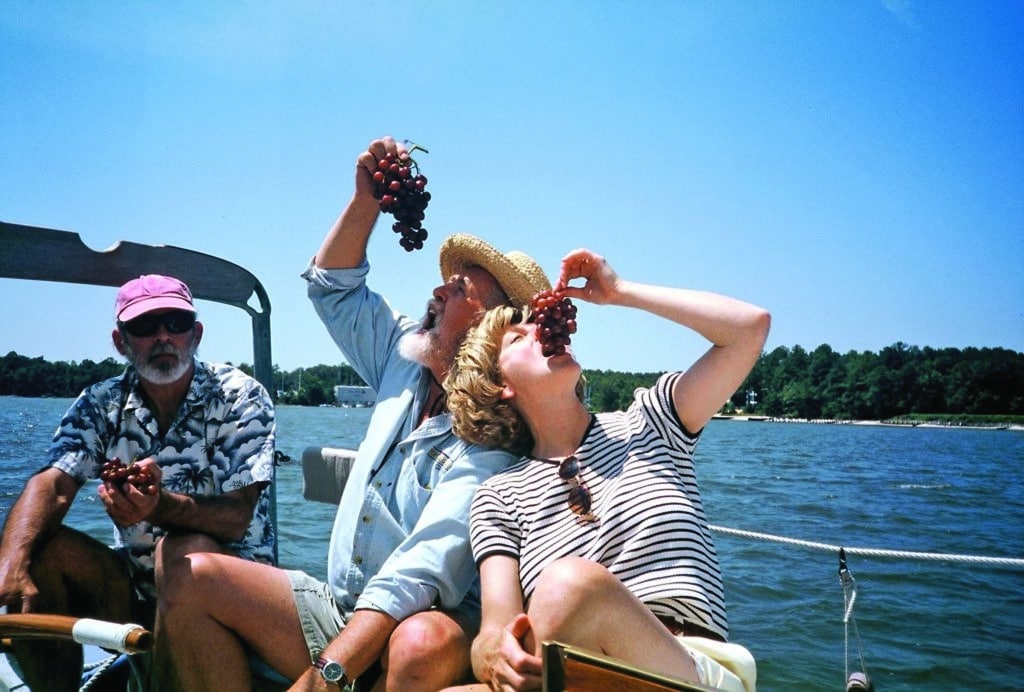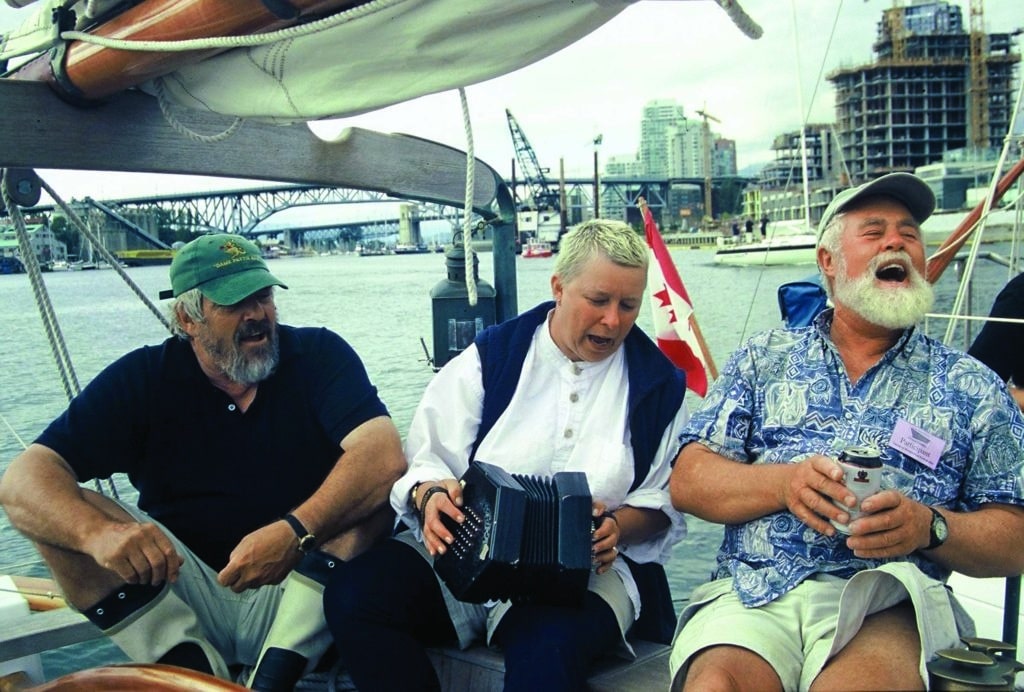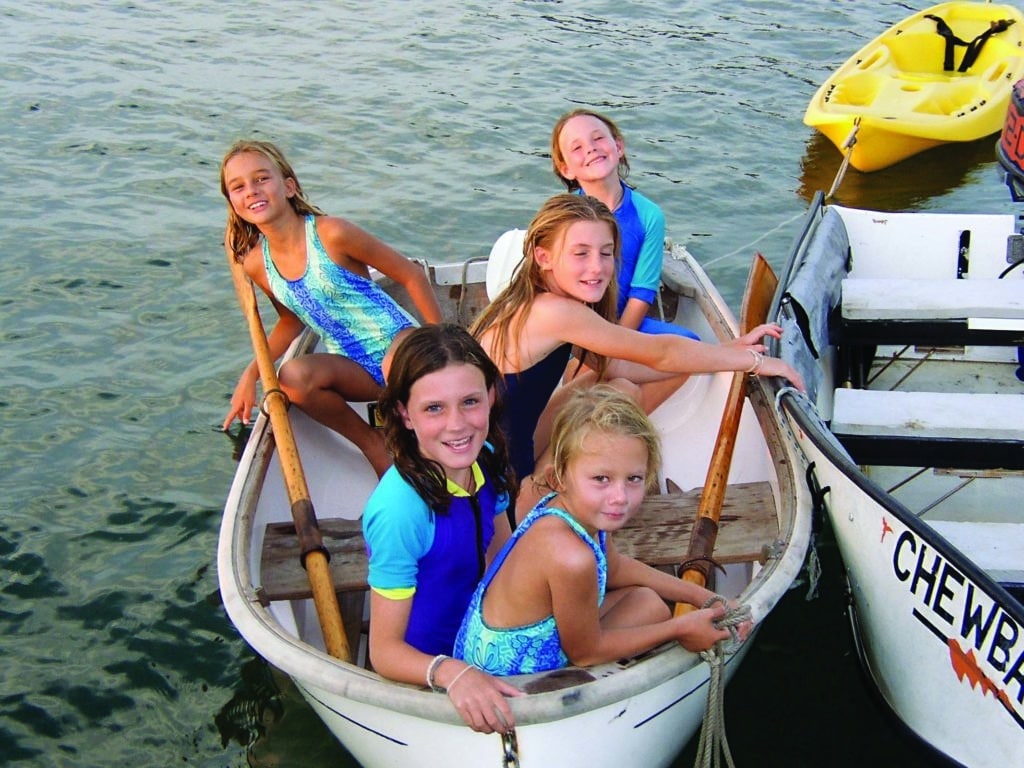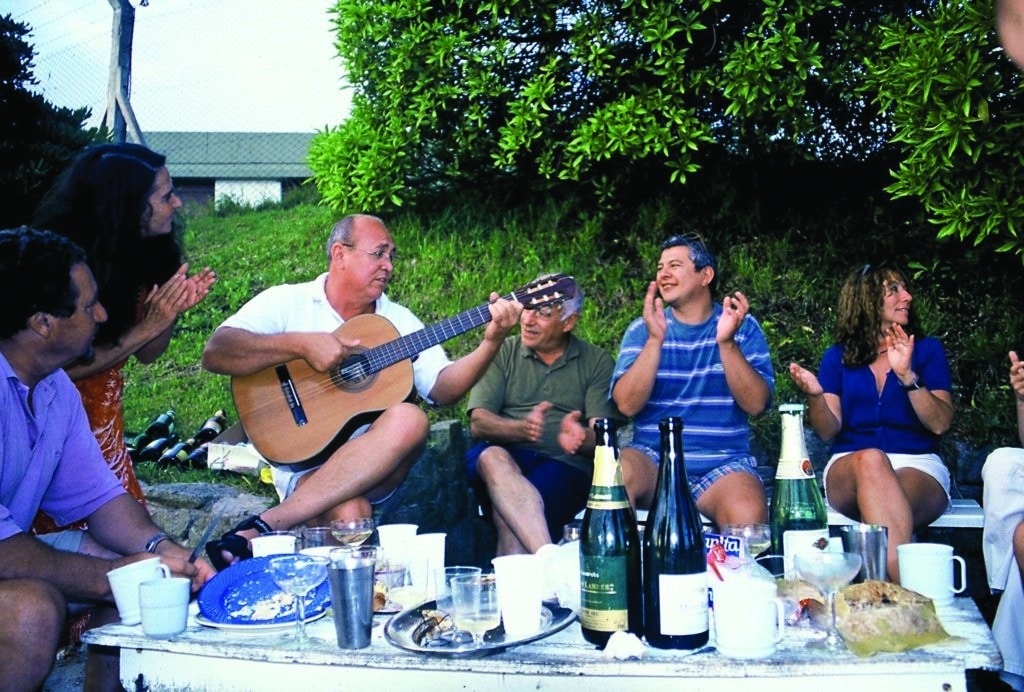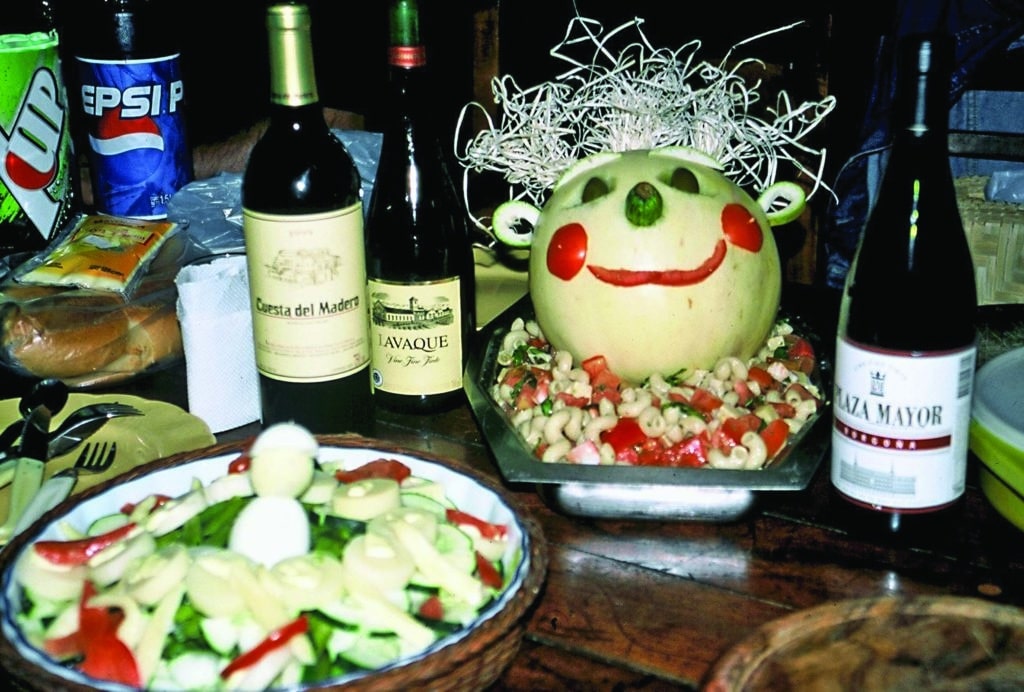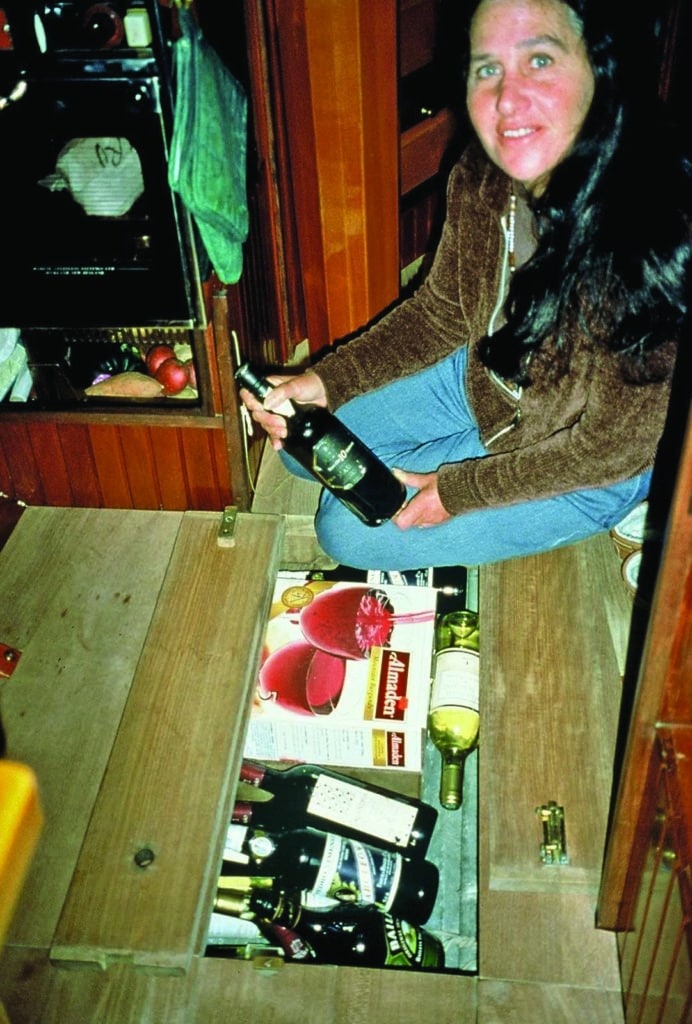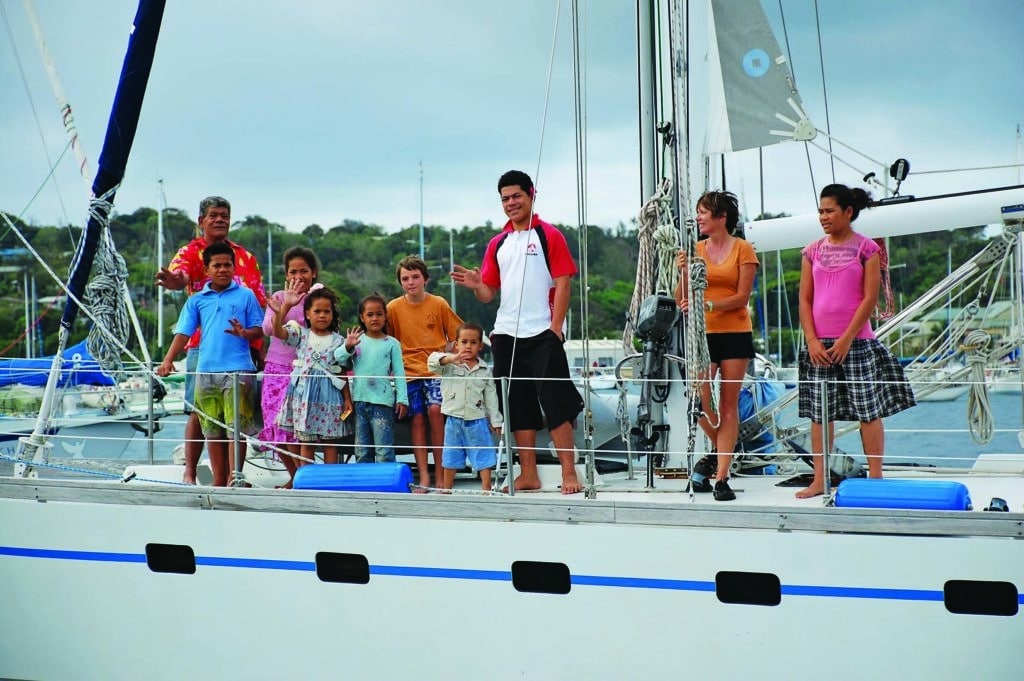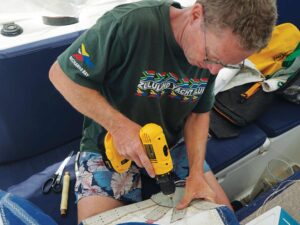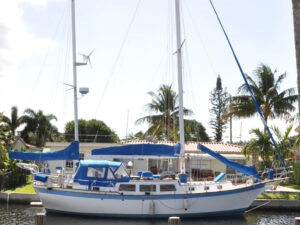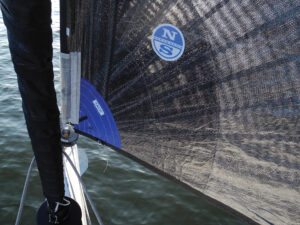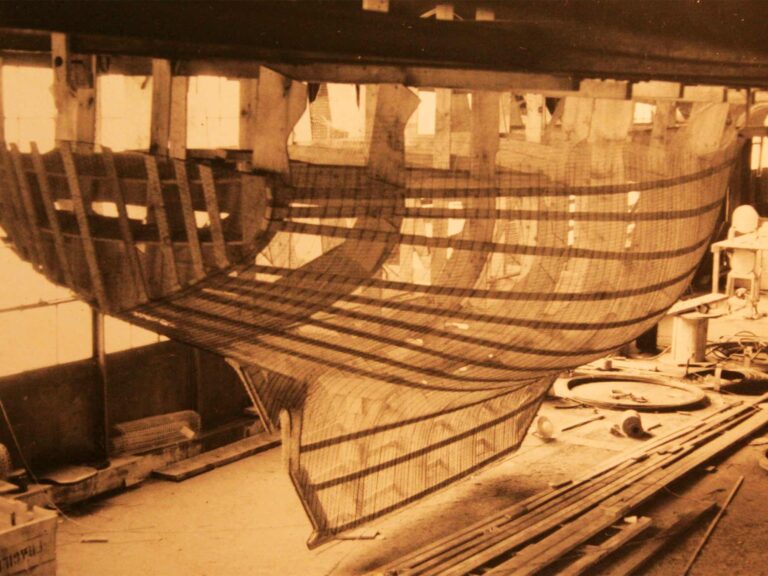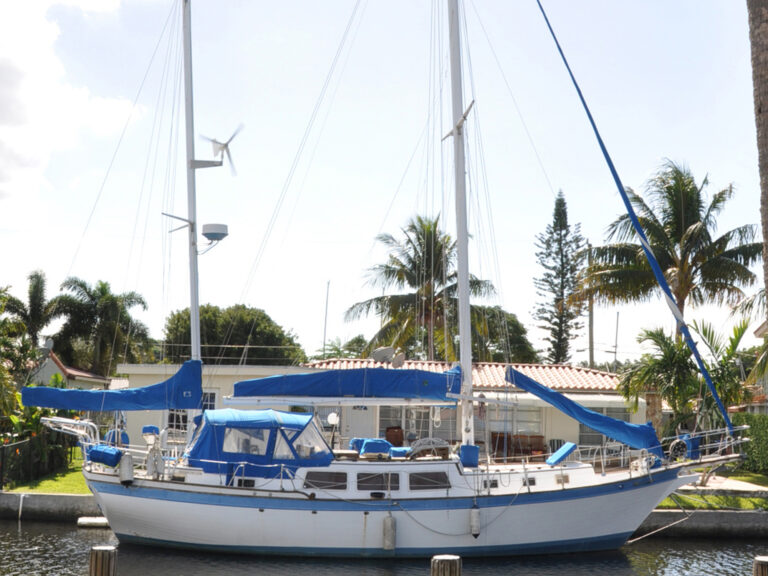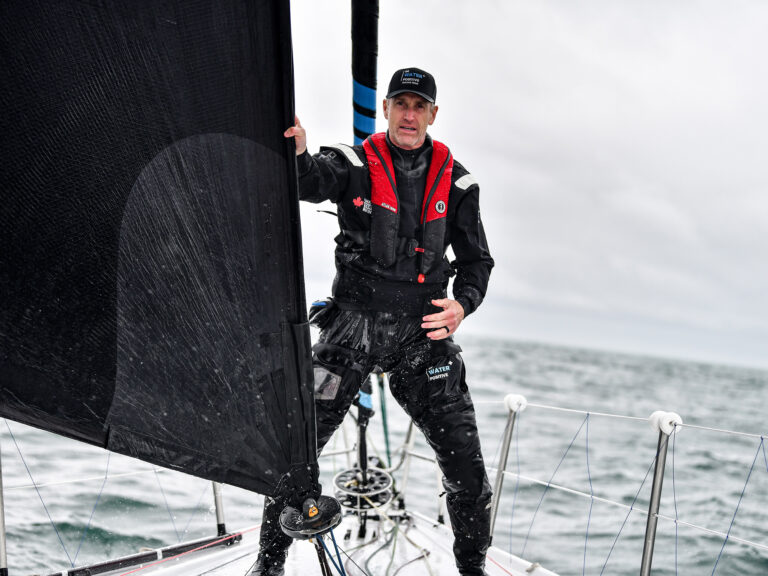The evening is abuzz with talk of favorite anchorages, the next passage. As Kyle Hopkins and I organize the food, we have time to chat. She and her husband, Doug, arrived in New Zealand’s Bay of Islands after spending two years sailing their 32-foot cutter, Astrala, from Connecticut via Pitcairn Island with two youngsters on board.
“I never guessed how social our lives would be when we set off cruising,” Kyle comments. “First new anchorage we sailed into, folks rowed by. I invited them on board, then realized we didn’t have spare coffee mugs to offer them.” From etiquette to expectations, entertaining afloat was an unexpected part of Kyle’s cruising education.
As Kyle found out, work and community commitments no longer dictate how you spend each hour of your day when cruising. This leads to the opportunity and need to entertain far more than many people expect. But ask returned voyagers what they miss, and the vast majority will say “the easygoing social life.”
Easygoing is the word to remember. Entertaining afloat does not have the same constraints or expectations that often leave shore-based hosts exhausted. On the other hand, the casualness of this new lifestyle may hide potential pitfalls for unwary hosts.
Socializing afloat tends to break down into five categories: 1) row-by, come aboards; 2) casual, just happened because someone came by to trade books; 3) planned invites for fellow cruisers; 4) planned invites for folks from shore; and 5) potlucks.
The quiet of morning lures you out into your cockpit. Someone rows by and says, “I like your boat.” A conversation ensues and you learn that cruising social life can be like a throwback to those days when folks used to sit on the front porch and greet neighbors as they walked by. Refreshments for these row-bys are simple: an offer of whatever it is you’re having — coffee, a cookie or a piece of toast.
When folks come to trade charts or ask how to fix something, I like to offer a drink. Because many folks do not feel comfortable refusing alcoholic beverages, I offer coffee, tea or fruit juice, along with wine or beer. Since these get-togethers usually have been planned, I often set out popcorn or any small nibble that lets me avoid the appearance of having spent a lot of time prepping for what is intended to be an easygoing, relaxed situation. This is important, as just like ashore, cruisers can feel the pressures of “keeping up with the Joneses.”
In each situation, it’s also important to remember that onshore, homes have separate kitchens, so one partner can easily entertain a friend while the other continues with his/her project of the moment. Afloat, this is usually not the case. It definitely pays to find ways to help both partners enjoy visitors on board. “Mary loves this full-on social stuff, but my privacy is out the window as soon as we get to port,” is one complaint we’ve heard. “John loves it all; I get all the work while he sits and pontificates,” is another.
Over the years, Larry and I have set up some protocols to help keep the balance. Situation: Larry is in the cockpit reading, while I’m below writing. Someone from another boat rows by and they chat for a while, and then Larry says, “Hold on while I see if Lin is decent.” He pokes his head into the boat and I have a chance to say quietly, “Invite him on board.” Or, “Not right now — invite him for later.”
Once on board, it’s the responsibility of whoever did the inviting to get the coffee or drinks. Since I do the majority of provisioning and cooking, we decided long ago that any spur-of-the-moment invitations to join us for a meal are my decision. We have a prearranged signal system that lets me know if Larry would like visitors to stay for a meal. It’s then up to me to invite them or to suggest another time to share a meal with us.
We also have prearranged time-to-end-the-gathering signals. One of these is to ask our guest to sign the guestbook. British sailors recognize this as a farewell timer. But for others, it is up to the inviter to find an opportune moment to say, “Let’s adjourn to your boat or ashore so Lin can finish her project.”
Entertaining fellow cruisers with a meal can be easy. They understand the challenges of life afloat. If cooking problems make me want to delay a gathering, I feel comfortable asking Larry to row over and tell the invitees to arrive an hour later than originally planned.
There are other tricks to make an evening like this flow well. Never tell anyone what you plan to serve. If you aren’t locked into a set menu, a scorched pan of rice can be tossed and potatoes substituted without your feeling like a failure. Above all, keep your menus simple. This is not a game of impress-the-boss — it’s an excuse to have some laughs and be with people of like mind. Have nibbles ready before your guests arrive, but only put out half at first. If there are two or three different starter items, bring them out one at a time. This lets you extend or shorten the time spent waiting for your dinner to be ready. An important rule of etiquette is, please, don’t leave your SSB radio or VHF on and expect guests to converse over the noise.
One of the nicest ways to thank folks you meet onshore is by inviting them onboard for a meal. Through the years we’ve entertained people as divergent as shark fishermen in Mexico and the oil-baron owner of a 2,400-acre estate in the south of England. Almost every invitee reacts the same way when they come aboard.
They shower us with questions, have a few awkward minutes figuring out how to climb below, then turn from near-strangers to “amigos” in an amazingly short time. For these folks, I always try to make a simple meal that they can identify as North American. A choice that has proven universally successful is hamburgers. I bake hamburger-style rolls using my standard bread recipe, then I put out a platter with slices of tomato, lettuce, cheeses, pickles and onions, plus condiments such as pickle relish, mustard and ketchup. With or without potatoes, salad or side dishes, this always makes a hit.
Shore-based guests may be unfamiliar with the customs of life afloat, and also with getting into and out of the dinghy you used to ferry them from shore. When dinner is over, I say something such as “Be sure to let us know as soon as you feel like going ashore. We’ll row you there any time you wish.” If we feel the wind rising, we have sometimes suggested going ashore to a local café for dessert rather than risk staying until the ride ashore could be potentially scary for people who may already find it a major adventure to cross the bay in an 8-foot dinghy.
Most people you invite for meals will offer to bring something in order to share the cooking load. Unless you have a very specific menu planned, accept the offer, then tell your guests candidly what you would like them to bring. Why not share the load and thus make entertaining — financially and workwise — easier for everyone? As several New Zealand sailors told us when we first arrived here, “Of course, we always potluck. That way, we can afford to have more parties!”
Through the years, dozens of onshore potlucks created some of the most specialmemories of our wandering life. We shared a catch of fresh salmon with 80 Canadian sailors after watching the full moon rise near Desolation Sound; we savored a bushel basket full of oysters and mussels with local fishermen on the banks of the Ría de Arosa in northwestern Spain. But since customs differ, we’ve learned to ask if those hosting the potluck are providing plates and cutlery. We also check to see if we are expected to bring our own meat as well as a side dish (as is the case at many New Zealand potluck gatherings). A good rule of thumb is to make enough of your chosen dish to feed about eight people. If you have some very special recipe that always has guests looking for seconds, it’s appropriate to double the quantity. Add some kind of meat or fish to any salad that you take, thus letting it double as a main course. (The usual shortfall at potlucks is with meat or fish dishes.) If you plan a potluck ashore in an anchorage shared by half a dozen yachts, be sure to extend an invitation to every crew. That way, your party will not disturb anyone — nor will anyone feel left out. Invite everyone to bring along any musical instrument they may have on board. Many special memories come from singing along while someone strums a battered guitar and finding that people worldwide seem to know the words to “Bobby McGee.”
A difficult problem can occur when the weather starts to deteriorate as you’re sharing a meal ashore or afloat. Unfortunately, the security of your boat must always come first. We were anchored in Port Eden, just north of Australia’s infamous Bass Straits and a perfect place to shelter from strong northerly wind, when we met an interesting couple onshore. Larry invited them to join us for breakfast the next day. By morning the wind had shifted to the south. Before he rowed ashore, Larry had said, “I’ll row them out, we’ll have a nice breakfast, then we can move to a safer place after they leave.” Unfortunately, the wind kept rising. Our guests were completely unconcerned as the boat began to buck a bit. By the time we felt it was gracious to take them ashore, Larry had a hard time rowing back to the boat. By the time we got the anchor chain straight up and down, the swell was up to four feet. The jerking on the anchor rode before it broke free was enough to bend the anchor shackle. The bent shackle shook our trust in the chain, which led to the expense of not only replacing the shackle but also having the whole chain tested in Tasmania. It would’ve been far wiser and less costly to be candid with our guests by apologizing and canceling the breakfast invite.
Even with the open schedules of cruising, each of us has times when reality strikes. You need time to do maintenance jobs or handle outside commitments, or one of you just wants some downtime. You’ll have to learn that it is fine just to say no. A few years ago we planned a rendezvous with Evans Starzinger and Beth Leonard in a quiet anchorage in the Canadian Gulf Islands. Their 47-footer, Hawk, was at anchor when we sailed in. Evans came out in his dinghy to greet us. “Beth is really seriously into her project,” Evans told us. “I suggest we don’t disturb her until 1600, then she’ll feel good about her day.” I was very impressed with his desire to make us feel welcome, and at the same time to encourage Beth. Our slow-paced rendezvous was full of laughter, good food and time for all of us to get our own projects done too.
Like all of the best things in life, entertaining afloat takes some discipline, some planning and a sense of adventure. But, as Kyle Hopkins and the band of cruisers who danced that evening away reminded us, it’s one of the greatest pleasures of cruising.
With her husband, Larry, Lin Pardey has sailed over 180,000 nautical miles and circled the planet twice on engineless boats the couple built themselves. They are the authors of nearly a dozen books, including The Care and Feeding of Sailing Crew, 4th edition, from which this article is excerpted. This article appeared in the June 2014 issue of Cruising World.
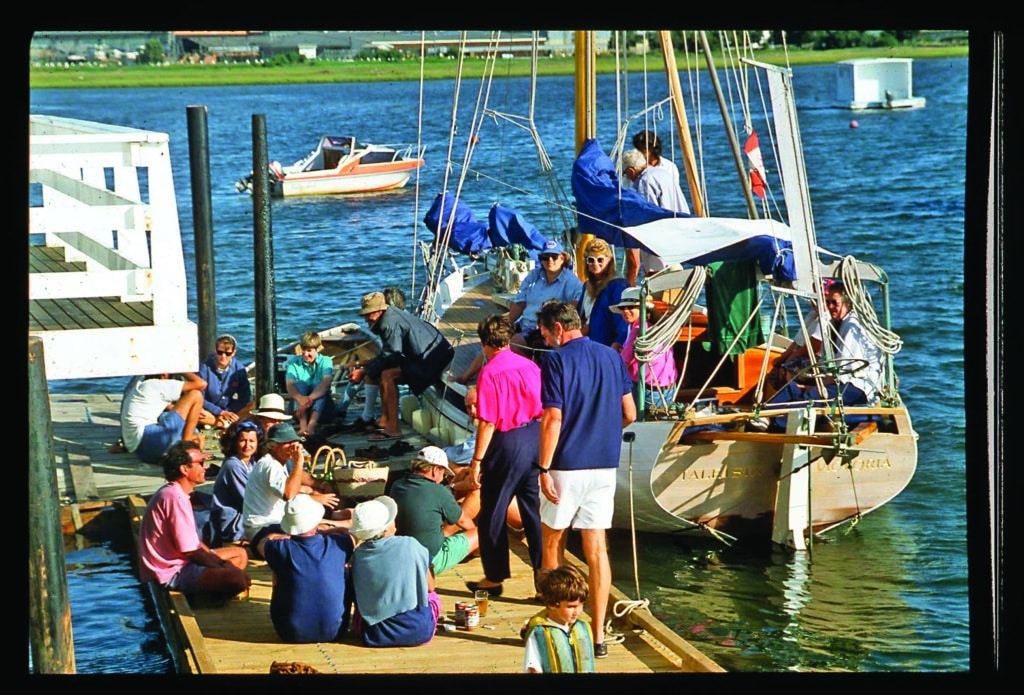
Boat Party
